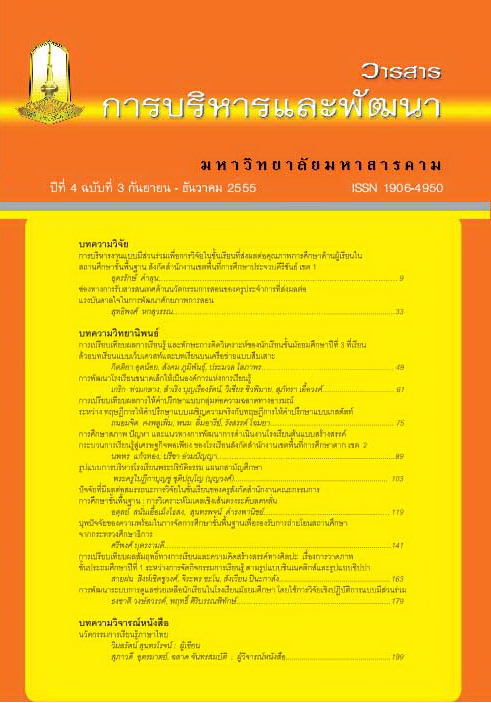การเปรียบเทียบผลการให้คำปรึกษาแบบกลุ่มต่อความฉลาดทางอารมณ์ ระหว่างทฤษฎีการให้คำปรึกษาแบบเผชิญความจริงกับ ทฤษฎีการให้คำปรึกษาแบบเกสตัลท์
Main Article Content
บทคัดย่อ
บทคัดย่อ
การวิจัยนี้มีความม่งหมายเพื่อ 1 ) เปรียบเทียบความฉลาดทางอารมณ์ของนักเรียนชั้นมัธยมศึกษาปีที่ 4 ก่อนและหลังการให้คำปรึกษาแบบกลุ่มตามทฤษฎีการให้คำปรึกษาแบบเผชิญความจริง 2) เปรียบเทียบความฉลาดทางอารมณ์ของนักเรียนชั้นมัธยมศึกษาปีที่ 4 ก่อนและหลังการให้คำปรึกษาแบบกลุ่มตามทฤษฎีการให้คำปรึกษาแบบเกสตัลท์ 3) เพื่อเปรียบเทียบความฉลาดทางอารมณ์ของนักเรียนชั้นมัธยมศึกษาปีที่ 4 ระหว่างการ ให้คำปรึกษาแบบกลุ่มตามทฤษฎีการให้คำปรึกษาแบบเผชิญความจริง และทฤษฎีการให้คำปรึกษาแบบเกสตัลท์ประชากรและกลุ่มตัวอย่าง คือ นักเรียนชั้นมัธยมศึกษาปีที่ 4 ที่มีคะแนนประเมินความฉลาดทางอารมณ์ตํ่ากว่าเกณฑ์ปกติ ได้มาโดยการเลือกแบบเจาะจงจำนวน 16 คนแบ่งเป็นการให้คำปรึกษาแบบกลุ่มตามทฤษฎีเผชิญความจริงจำนวน 6 คน การให้คำปรึกษาแบบกลุ่มตามทฤษฎีการให้คำปรึกษาแบบเกสตัลท์ จำนวน 6 คน เครื่องมือที่ใช้ในการวิจัยได้แก่ แบบประเมินความฉลาดทางอารมณ์ของกรมสุขภาพจิตระดับอายุ 12-17ปี โปรแกรมการให้คำปรึกษาแบบกลุ่มตามทฤษฎีการให้คำปรึกษาแบบเผชิญความ จริงและโปรแกรมการให้คำปรึกษาแบบกลุ่มตามทฤษฎีการให้ฟังคำปรึกษาแบบเกสตัลท์ สถิติที่ใช้ในการวิเคราะห์ข้อมูล ค่าเฉลี่ย ส่วนเบี่ยงเบนมาตรฐานการทดสอบสมมุติฐานของวิลคอกซอล (The Wilcoxon Mathehed Pairs Signed Ranks Test) และการทดสอบของ แมนวิทนีย์ (The Mann Whitney U Test) ผลการวิจัยปรากฏ ดังนี้
1. นักเรียนชั้นมัธยมศึกษาปีที่ 4 มีความฉลาดทางอารมณ์สูงขึ้น หลังจากการได้รับคำปรึกษาแบบกลุ่มตามทฤษฎีการให้คำปรึกษาแบบเผชิญความจริง อย่างมีนัยสำคัญทางสถิติที่ระดับ .05
2. นักเรียนชั้นมัธยมศึกษาปีที่4มีความฉลาดทางอารมณ์สูงขึ้นหลังจากการได้รับคำปรึกษาแบบกลุ่มตามทฤษฎีการให้คำปรึกษาแบบเกสตัลท์อย่างมีนัยสำคัญทางสถิติ ที่ระดับ .05
3.นักเรียนชั้นมัธยมศึกษาปีที่ 4 มีความฉลาดทางอารมณ์แตกต่างกันหลังจากการได้รับคำปรึกษาแบบกลุ่มตามทฤษฎีการให้คำปรึกษาแบบเผชิญความจริงกับทฤษฎีการให้คำปรึกษาแบบเกสตัลท์อย่างมีนัยสำคัญทางสถิติที่ระดับ .05นักเรียนชั้นมัธยมศึกษาปีที่ 4 ที่ได้รับการให้คำปรึกษาแบบกลุ่มตามทฤษฎีการให้คำปรึกษาตามแบบเกสตัลท์มีความฉลาดทางอารมณ์สูงกว่า นักเรียนชั้นมัธยมศึกษาปีที่ 4 ที่ได้รับการให้คำปรึกษาแบบกลุ่ม ตามทฤษฎีการให้คำปรึกษาแบบเผชิญความจริง
คำสำคัญ : การให้คำปรึกษาแบบกลุ่ม, การให้คำปรึกษาแบบเผชิญความจริง, การให้คำปรึกษาแบบเกสตัลท์, ความฉลาดทางอารมณ์
ABSTRACT
The purposes of this experiment research were : 1) To compare the EQ of students in Mahasarakham level four during pre and post counseling based on the reality theory . 2) To compare The EQ of students in Mahasarakham level four during pre and post counseling based on the Gestalt theory. 3) To compare the EQ of students in Mahasarakham level four between the group counseling based on the Reality theory and the Gestalt theory. The sample used in this study consisted of Mahasarakham level four students , whose Emotional quotient scores classified in the lower level. By purposive 16 Students were divided into two groups and each group consisted of students . The two types of instruments were : 1) The Emotional Guotient test of Mental Health Department level age 12-17 years . The test consisted of 52 items and a rating scale. 2) The Counseling program on Reality theory and counseling program on Gestalt theory. The statistics used for analying date were means , standard deviation : and the Wilcoxon Matched Pairs signed Ranks Test and the Mann Whitney บ test. The results of the study were as follows :
The Mathayomsuksa level four students had higher Emotional Guotient after received group counseling based on the Reality theory than before counseling .05 as a level of significance.
The Mathayomsuksa level four students had higher Emotional Quotient after received group counseling based on the Gestalt theory than before counseling .05 as a level of significance.
The Mathayomsuksa level four students had differently Emotional Guotient after received group counseling based on the Reality theory and group counseling based on the Gestalt theory .05 as a level of significance. The Mathayomsaksa level four students who received group counseling based on the Gestalt Theory had higher Emotional Quotient than the Mathayomsaksa level four students who received group counseling based on the Reality theory .
Keywords : Group counseling, Reality counseling, Gestalt counseling Emotional Quotient

